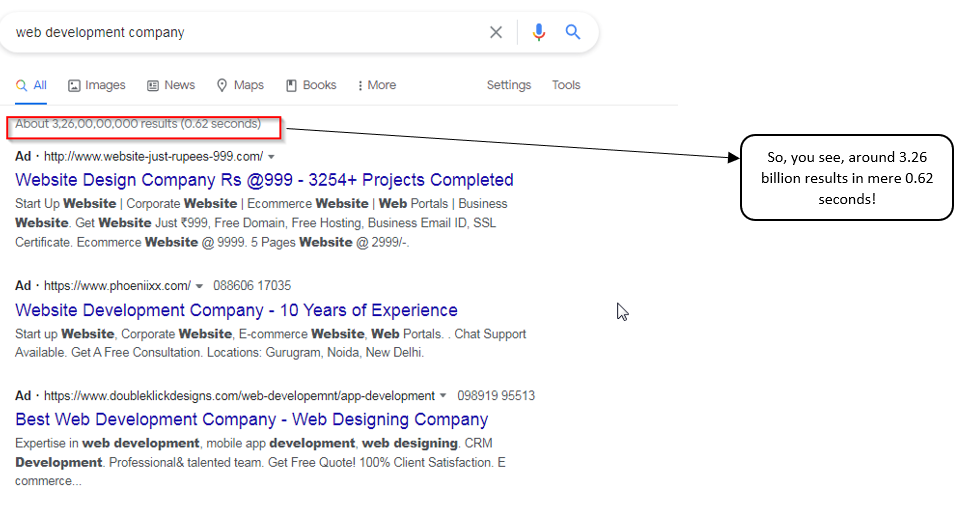Toggle navigation

2020-21 can rightly be termed as a period of digital disruption. New technological behaviours in terms of purchasing as well as marketing have developed in response to the pandemic at a rate never seen before. We have vaulted at least five years forward in digital adoption in a matter of a few months. In light of these changing buyer behaviour and now visible opportunity to exponentially expand the business, even the organizations that have been running successfully in traditional businesses models are going online.
Are you, too, looking to reap the benefits of the digital revolution?
Are you, too, considering getting a website for your business?
If yes, you must have surely taken the first step, i.e., a Google search to explore web development services.
While this digital frenzy appears recent, the web development industry isn’t and has a multitude of players, big and small. To put things in perspective, here is what a quick Google search will yield:

No wonder, choosing the right website development company for your business can be mind-boggling. But don’t fret. Because that’s what we are going to talk about.
In this blog, we will discuss the most important factors you should consider while finalizing a website development company for your business.

This one is a no-brainer. If the company hasn’t put in efforts into their own website, they are not likely to build an impressive product for your business. Check out the look and feel of the website, its functionalities, and the user experience it offers. Also, evaluate the quality of content published on it.
Most web development companies have a section on their past projects. Simply having a look at it will give you a fair idea of what the company is capable of doing. And this brings us to the second vital parameter-portfolio.
Depending on the vertical you operate in, you may need anything from a very simple to a highly complex website. For instance, something like an e-commerce portal requires intricate work on both the front-end and back-end. Hence, choosing a company experienced in your niche would stand you in good stead.
We have noticed how trends in any industry keep changing with time. Target web development vendors that have a good understanding of your vertical and are familiar with its challenges. This way, you will have a product that’s in line with your expectations.
As you may already know, a technology stack is nothing, but the combination of tools, frameworks, and programming languages used in web development. Before discussing which technology stack to choose, let’s have a look at the various popular stacks used these days:
LAMP Stack: This stack comprises Linux operating system, Apache HTTP server, MySQL database management, and PHP programming language. LAMP is typically used for building dynamic web applications.
MEAN Stack: MEAN stack is a collection of JavaScript technologies that include MongoDB, Express.js, Angular JS, and Node.js. Out of these, MongoDB is a NoSQL database system, Angular JS is a JavaScript framework, Express.js is a framework running on Node execution domain, and Node.js is a server-side JavaScript execution environment. Owing to the use of JavaScript and MVC architecture, MEAN is commonly used for creating scalable applications.
Ruby on Rails Stack: In this stack, Rails is a web development framework written in Ruby language. Ruby on Rails enables swift development and deployment of your website owing to its MVC pattern, RESTful design and object-oriented programming.
Python/Django: Django is a server-side framework written in the Python programming language. The stack is commonly employed for building a minimum viable product (MVP) that has all the essential tools for scalability. It can be integrated with third-party applications to speed up development.
.NET: This technology stack includes C# programming language in addition to the .NET framework.
Now, the choice of your technology stack will depend on a whole range of factors like the size of your project, timeframe for development, and ease of scalability. Let’s discuss briefly how different stacks can be used in different scenarios.
You may be looking for anything ranging from a small, simple website to a complex web portal. If you are looking for a basic website, a content management system (CMS) such as WordPress, Drupal, or Joomla would do the trick.
If, on the other hand, you need a small e-commerce portal or an organisational website that needs a couple of functionalities and integration across various platforms, MEAN or .NET can be a good fit.
If you are eyeing a large project such as a social media site or a large e-commerce platform that demands customization as well as scalability, the recommended technology stacks would be PHP, Python/Django or RoR.
For those of you looking to publish a website real fast, Ruby on Rails and Python/Django can be great options. While the former comes with open-source libraries, the latter offers seamless integration with third-party applications.
Then, some of you may not be looking to build a full-fledged product right away. Many businesses first get a minimum viable product (MVP) built with all the core functionalities they want in the final product. If they find the MVP is up to their expectations, they go ahead and get the final product built. In such a scenario, your stack of choice should be MEAN or Python/Django.
There’s no denying that your web development partner would guide you on the technology stack before the project kicks off. Even so, with a fair idea of various stacks, you can ask them to use the stack that would be most appropriate under any scenario. Hence, we strongly suggest that you go for a technology company that offers a range of stacks. This way, you can have what exactly you are looking for and not forced to choose from a narrow range of options.
Web development companies work across a broad price range. As is mostly the case, the higher the price, the better the quality. A good approach can be to fix a budget and search for companies falling within that range.
You may be enamoured by the glossy websites of various multi-national corporations, but keep in mind that they all come at a cost. At the same time, you will find a lot of website designers who work on a project basis and command a low price.
It is essential to figure out how much you can afford to spend on developing the site without compromising on the prime goal of getting the website made.
Regardless of how small your website is, you will have to incur expenses on security certifications and digital marketing services once you go live. These have to be factored in while deciding the total cost of project.

In any development project, you are required to work in close association with your vendor for a span of at least 3-6 months. Hence, it’s vital that you have developers who are capable of communicating with the utmost ease.
Assess the soft skills of the developers, check how frequently they reply to your email queries, and how proactive they are otherwise. By doing so, you will get a fair idea of how well they have understood what you have communicated and how easy or difficult the communication is going to be once the project commences.
It’s essential that you know the people working on your project well. What if you work with one of the best web development companies but have your work assigned to newbies?
In addition to connecting with these people on e-mail and video chats, you should try to meet them in person. This will not only help dispel any doubts regarding their credibility but also lay the foundation for solid communication channels.
As you might know, development companies usually follow any of the three methodologies while executing their projects:
This method is akin to building a house. The development team works on one section at a time, and once that section is finished, only then they move on to the next. Testing is done only when the product has been deployed.
In this model, the project timeline and cost are determined in the very beginning, so the entire picture is clear from the outset. That said, the waterfall approach happens to be somewhat rigid, so you might face challenges in getting changes done to your product.
As the name implies, agile is an iterative approach where a project is divided into smaller chunks (sprints), and teams are divided to work on different sprints. At the end of a sprint, they come together to discuss their progress and the issues they may be facing. Testing is done at the end of every sprint (and not at the end of the project as in waterfall). This way, bugs are fixed right away.
The chief benefit of agile is that you can add or remove features while the project is going on and adjust requirements along the way.
While agile is gaining popularity as the preferred model, no one wants to miss out on the benefits of the waterfall. So, a hybrid approach has come into the picture lately. Here, the development team tries to define the planning and budgeting requirements upfront (waterfall approach) and then shifts to the agile methodology when it comes to design, development and testing.
The methodology you choose depends on how well your development team understands your requirements and what they are comfortable with.

Once you have the design and development part sorted, you will need additional services to make your website function seamlessly. These include web hosting, SEO, data migration, security certification, etc. If you believe these are just a bunch of ‘good-to-have’ services, they are not. They are integral to the running of your website.
If you don’t have a quality hosting solution in place, your website may experience frequent downtime or take time to load. Similarly, if you fail to promote your business properly, it will not rank in search engines and the purpose of creating a website will be defeated.
Instead of getting these services from different vendors, look for a company that offers every such service as a part of your web development package.
As an illustrious technology company in India, Cyfuture offers the whole gamut of web development services in their end-to-end solution. Owing to our tier-III data centre facilities, we provide our clients with robust web hosting, data migration, and cloud-based services. These services not only support your website but also do away with the hassle of contacting dozens of vendors.
Many of you may be under the impression that your web development project will end when your website goes live. No, it does not. In fact, that’s the period when most of the issues come to the fore. You may load your site and find that a crucial feature is missing. Or, you may want to add a functionality after seeing the live version of the website.
The level of support you need will vary depending on the size and complexity of your project, the experience of your developers, and the level of communication between the two parties. Assess the kind of support your prospective vendor is offering, and if it will be adequate for smooth running of your application.
Questions to Ask your Prospects
We have already discussed a few criteria to help you shortlist prospective candidates. In addition to these criteria, there are certain questions you must ask your prospective vendor to make sure they fulfil your requirements in the best possible manner.
Choose the Right Web Development Partner to Get the most out of your Online Business
There’s no denying that getting a website built is a complex task and you are likely to face unforeseen hurdles as your project hits the ground. By selecting a reliable web development company like Cyfuture over any freelance agency, you can not only make the task less overwhelming but also bring down time-to-market and the overall project cost significantly.
As a two-decade-old entity, we have profound experience in the technological space, particularly in web development, custom mobile application development, hosting, SEO and cloud & infrastructure solutions. Choose Cyfuture’s meticulously tailored solutions NOW to ace your online game. Visit our new page for details.
Thanks for reading!
Leave a Reply